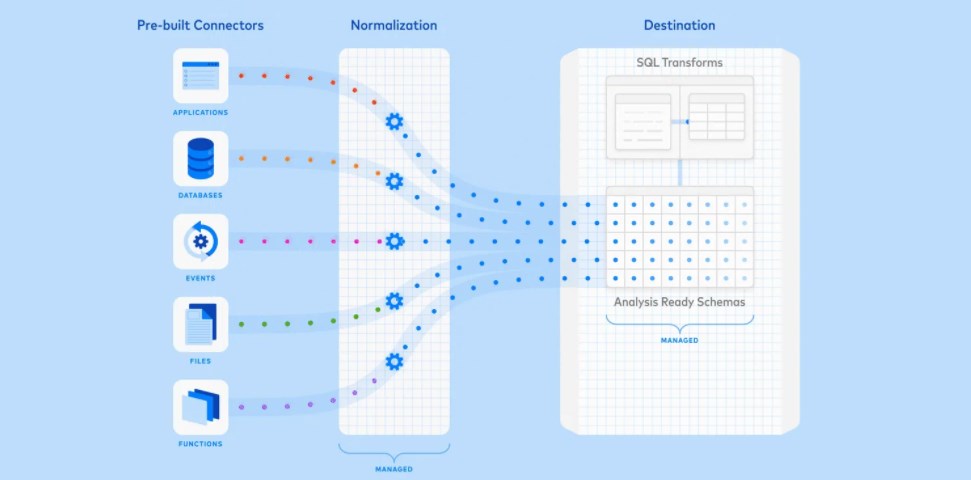Four out of five companies that adopt a strategic approach to data-driven technology outperform their peers and achieve their business objectives, according to a 2019 Deloitte survey.
Data is the lifeblood of technology companies. However, many organizations struggle to derive value from their information despite capturing customer data, product usage, IoT data, telemetry data, and more. Leveraging these resources can drive business results and AI initiatives, and ensuring cybersecurity is essential for long-term success.
Fortunately, leaders in the technology industry have demonstrated the path to success, one that can be replicated by other companies, as well as by technology-enabled organizations across all industries.
Learn more about the top trends and disruptors in the technology sector, and discover eight best practices for data-driven technology organizations that can help you achieve business success.
Trends and disruptors in the technology sector
Deloitte Consulting has identified five major trends and disruptors for the technology sector.
1. Artificial intelligence
The demand for real-time decision-making is driving the need for specialized artificial intelligence devices.
2. Automation
Trends such as faster order fulfillment, real-time monitoring, and automated delivery services are driving automation.
3. 5G
Increased performance and efficiency are expected to enable new and improved user experiences.
4. Internet of Things
The “ Internet of Things ” is underway, but security concerns are preventing widespread adoption.
5. Cybersecurity
The rise of sophisticated ransomware attacks is being countered by new artificial intelligence initiatives and unified security strategies.
Best practices for organizations with data-driven technology
How can tech companies leverage data to drive growth? Below are some valuable tips from leaders and experts in the tech industry and beyond.
Promote an organization where all leaders and employees make data-driven decisions. One of the values every company should have is "seeking the truth." Making better decisions through a deep understanding of the world. However, ultimately, this is difficult without data-driven technology.
2. Set the right metrics
Commit to making decisions based on accurate and reliable metrics that will support your business objectives. To manage your results by metrics, you must determine which indicators are important. Choose one to three metrics and see if you can centralize your information in a single location for measurement and evaluation.
3. Generate a single source
Create a governed, scalable source for all your data that can be queried across multiple workloads and instantly accessible. The concept of a data lake versus an analytics dataset is becoming arcane. Getting data into one consolidated place with consolidated workflows is the way businesses should work. If you do it right, you'll never ask the same question twice and you'll get accurate answers.
4. Democratize your data
Make data easily and securely accessible so users across the organization, from engineering to marketing, can access it without bottlenecks. Store data where multiple teams can easily query, manipulate, and share it without submitting a request or asking another team. Taking your organization to that level of self-service is a great goal we should all strive for.
5. Connect and mobilize your information
Eliminate data silos that hinder communication and promote instant and secure data collaboration across your entire business ecosystem. It's imperative that companies with data-driven technology connect product information across the entire value chain from end to end—from sales and marketing to finance, human resources, and the supply chain—and move toward a platform and information delivery that scales across the front and back office.
6. Take advantage of machine learning
Create an open mindset toward technology to test and learn as the company develops AI initiatives. Also, ask for feedback when implementing any improvements to optimize and empower your team. Also remember that data-driven technology can help you automate certain tasks.
7. Modernize your data infrastructure
A modern data infrastructure like Snowflake's Data Cloud is essential to leveraging technologies that enable data-driven decision- making . The biggest challenge to adopting AI technologies is not having a modern data infrastructure. Machine learning can only learn based on the platform that provides the data.
8. Invest in data governance
Build and invest in adopting a data governance framework to mitigate risk and help ensure future business success. According to Deloitte, 73% of companies believe AI is essential for their business today.
According to Gartner, nearly 80% of executives say companies will lose competitive advantage if they don't use data effectively, but more than 50% of organizations lack a formal data governance framework.
Snowflake enables your business to improve its use of data-driven technology
Snowflake enables the best practices technology companies need to make insight-driven decisions. Learn more about the benefits you can gain by implementing this data warehousing platform!







